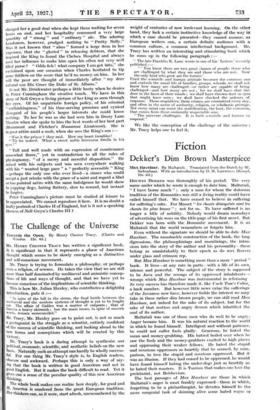The Challenge of the Universe
MR. HENRY CHESTER TRACY has written a significant book. It is significant in that it represents a phase of American thought which seems to be slowly emerging as a distinctive and self-conscious movement.
Mr. Tracy is trying to formulate a philosophy, or perhaps even a religion, of science. He takes the view that we are still more than half dominated by mediaeval and animistic concep- tions of life and ways of thought, and that we have yet to become conscious of the implications of scientific thinking.
This is how Mr. Julian Huxley, who contributes a delightful introduction, puts it :—
" In spite of the lull in the storm, the final battle between the mediaeval and the modern systems of thought is yet to be fought out. The affair of Galileo was a matter of outposts ; that of Darwin a heavy skirmish ; but the main issues, in spite of smooth words, remain unreconciled."
Mr. Tracy, Mr. Huxley goes on to point out, is not so much a protagonist in the struggle as a scientist, entirely confident of the success of scientific thinking, and looking ahead to the new forms and conceptions which will be created by this 'victory.
Mr. Tracy's book is a daring attempt to synthesise our political, economic, scientific, and aesthetic beliefs on the new basis. Naturally such an attempt can hardly be wholly success- ful. For one thing Mr. Tracy's style is, to English readers, obscure and awkward. Perhaps this is only a way of say- ing that the book is written in good American and not in good English. But it makes the book difficult to read. Yet it gives one a sense of the peculiar quality of this new American thinking. The whole book makes one realize how deeply, for good and _
America is sundered from the great European tradition. Her thinkers can, as it were, start afresh, unencumbered by the
weight of centuries of now irrelevant learning. On the other hand, they lack a certain instinctive knowledge of the way in which a case should be presented—they cannot assume, as European writers can, a certain definite audience with a common culture, a common intellectual background. Mr. Tracy has written an interesting and stimulating book which he sums up in the following paragraph :- " The late Franklin K. Lane wrote in one of his` Letters recently published :—
You know there are two great classes of people, those who are challenged by what they see and those who are not. Now` the only kind who grow are the former.' Until the scientific and human attitude becomes the common one and controls the usual life of families, groups, schools, we shall not know how many are challenged—or rather are capable of being challenged—and how many are not ; for NVO shall have shut. the door in the faces of their minds ; we shall have thrown dust in eyes that might have seen ; we shall have checked the ardours of response. These stupidities, these crimes, are committed every day, and often in the name of authority, religion, or scholastic prestige. Not every mind can resist the stultification, the hurt, the corrosion, that comes from these eminently respectable sins.
" The universe challenges. It is both scientific and human to respond."
We like the conception of the challenge of the universe : Mr. Tracy helps one to feel it.










































 Previous page
Previous page